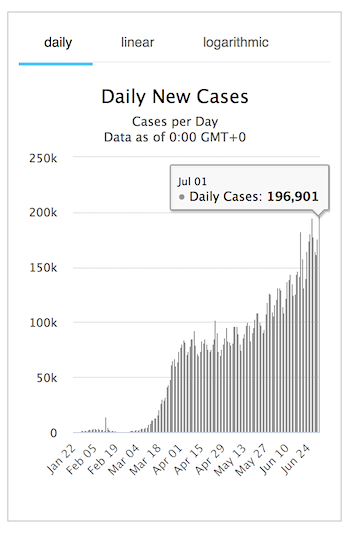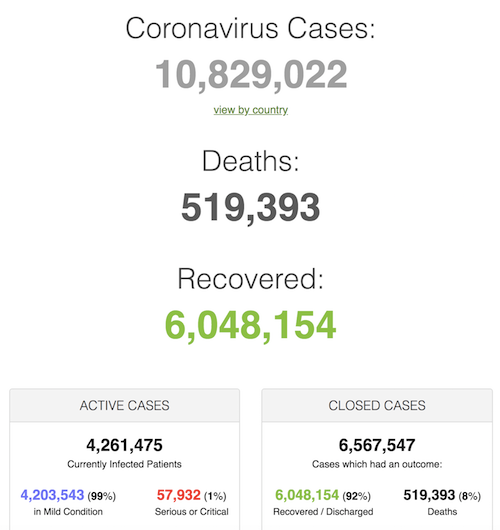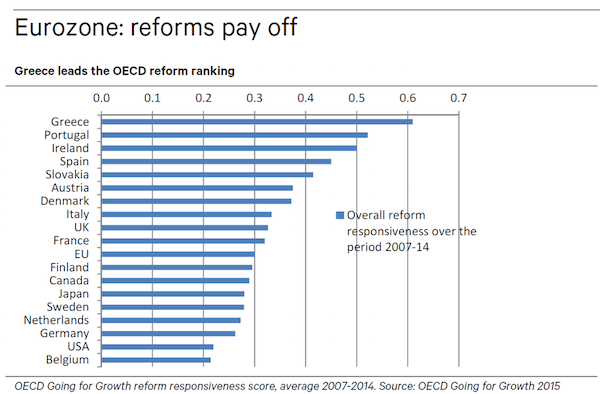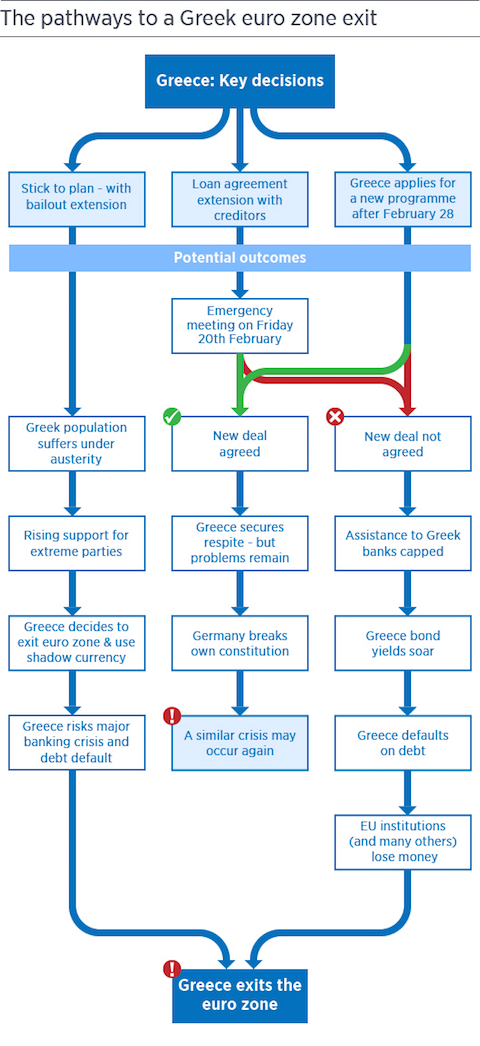
Marion Post Wolcott Unemployed coal miner’s mother in law and child. Marine, West Virginia 1938

As the virus rages on into ever larger record numbers, today we are treated to the hilarious sight of two presidential candidates each accusing the other of being a Marxist. #ComradeTrump goes viral. One gets the feeling that maybe both parties hired the same PR firm. Or at least ones that use the same playbook. Which fails to mention that the Soviet Union dissolved some 30 years ago.
Or maybe those PR guys are all 80 years old, you know, same age as the candidates themselves? See, I’m thinking you must have been at least 15 years old when the wall came down, and therefore now be 45 years or older, to be scared by a portrait of Lenin or Stalin. And that would mean the PR fails to reach anyone younger than that.
Or, yeah, you can say he’s the second coming of Maduro, the man whose life his administration has been trying to turn into a living hell. But then you would fail to reach anyone with one single working neuron left. Or maybe I would just not be a good PR guy.

But at least we now know what that NYT and WaPo Afghan bounty story was planted for: the Democrat House gets to block Trump from bringing American troops home. While accusing each other of being extreme left, which will at some point force entire dictionaries to revise the meaning of such terms, they all move steadily towards the far right and the bidding of the war machine.
It’s theater, nothing in it is real, and you’re -literally- buying into it. Or wait, no, there is one thing that is real: people are going to get killed.

Both the world and the US set new highs.





US yesterday 44,766 2nd highest. CA, TX, AZ, GA, SC, OK, ID, AK new highs. pic.twitter.com/D2R2egfX75
— Yaneer Bar-Yam (@yaneerbaryam) July 1, 2020
Record number of Americans sick with Covid-19 today, more than 50,000. That's 100x the new cases in Germany.
41 states reported Covid-19 dead. Endemic.
This is a snapshot of our behavior 14-21 days ago. We'll get worse from here.
It didn't have to be this way, you know.
— Ben Hunt (@EpsilonTheory) July 2, 2020

“..an abrupt turn from three days earlier, when the hospital system sent a note to thousands of patients, inviting them to keep their surgical appointments.”
Note to staff at a Houston safety net hospital:
-50% of new COVID tests coming back positive
-No more ICU beds
-No more remdesivir
-No more convalescent plasma
-12 COVID patients in need of ICU care — stuck in the ER
-Tomorrow will be worse…
• Crisis at Houston Hospitals as Coronavirus Cases Surge (PP)
At Lyndon B. Johnson Hospital on Sunday, the medical staff ran out of both space for new coronavirus patients and a key drug needed to treat them. With no open beds at the public hospital, a dozen COVID-19 patients who were in need of intensive care were stuck in the emergency room, awaiting transfers to other Houston area hospitals, according to a note sent to the staff and shared with reporters. A day later, the top physician executive at the Houston Methodist hospital system wrote to staff members warning that its coronavirus caseload was surging: “It has become necessary to consider delaying more surgical services to create further capacity for COVID-19 patients,” Dr. Robert Phillips said in the note, an abrupt turn from three days earlier, when the hospital system sent a note to thousands of patients, inviting them to keep their surgical appointments.
And at The University of Texas MD Anderson Cancer Center, staff members were alerted recently that the hospital would soon begin taking in cancer patients with COVID-19 from the city’s overburdened public hospital system, a highly unusual move for the specialty hospital. These internal messages highlight the growing strain that the coronavirus crisis is putting on hospital systems in the Houston region, where the number of patients hospitalized with COVID-19 has nearly quadrupled since Memorial Day. As of Tuesday, more than 3,000 people were hospitalized for the coronavirus in the region, including nearly 800 in intensive care.
“To tell you the truth, what worries me is not this week, where we’re still kind of handling it,” said Roberta Schwartz, Houston Methodist’s chief innovation officer, who’s been helping lead the system’s efforts to expand beds for COVID-19 patents. “I’m really worried about next week.”

Here’s your daily dose of hope….
• Coronavirus Immunity May Be More Widespread Than Tests Suggest (BBC)
People testing negative for coronavirus antibodies may still have some immunity, a study has suggested. For every person testing positive for antibodies, two were found to have specific T-cells which identify and destroy infected cells. This was seen even in people who had mild or symptomless cases of Covid-19. But it’s not yet clear whether this just protects that individual, or if it might also stop them from passing on the infection to others. Researchers at the Karolinksa Institute in Sweden tested 200 people for both antibodies and T-cells. Some were blood donors while others were tracked down from the group of people first infected in Sweden, mainly returning from earlier affected areas like northern Italy.
This could mean a wider group have some level of immunity to Covid-19 than antibody testing figures, like those published as part of the UK Office for National Statistics Infection Survey, suggest. It’s likely those people did mount an antibody response, but either it had faded or was not detectable by the current tests. And these people should be protected if they are exposed to the virus for a second time. Prof Danny Altmann at Imperial College London described the study as “robust, impressive and thorough” and said it added to a growing body of evidence that “antibody testing alone underestimates immunity”.

…. immediately followed by something worse..
• Doctors Say Half Of ‘Cured’ COVID Patients Still Suffer (ToI)
Recovered COVID patients are baffling doctors with complaints of freak pains, lungs that just won’t get back to normal, and a range of incapacitating psychological issues. “What we are seeing is very frightening,” Prof. Gabriel Izbicki of Jerusalem’s Shaare Zedek Medical Center told The Times of Israel. “More than half the patients, weeks after testing negative, are still symptomatic.” Izbicki is working on a study that involves follow-up with patients who were in hospitals or coronavirus hotels, looking at the aftereffects of the virus and trying to understand why patients continue to suffer long after being confirmed negative. “There is very little research about the mid-term affect of coronavirus,” he said, adding that it is much needed to guide doctors.
In Bnei Brak, at Israel’s first community clinic, doctors have been seeing a spike in recent days in the patients with pains that appear to come from nowhere. “It can appear in the arms, legs, or other places where the virus doesn’t have a direct impact, and if you ask about the pain level on a 1 to 10 scale, can be 10, with people saying they can’t get to sleep,” said Eran Schenker, director of the month-old clinic in Bnei Brak run by Maccabi Healthcare Services. “It’s something which we’re starting to see much more in the last week.” A patient from the clinic spoke to The Times of Israel on condition that her name is not published. She was diagnosed in March and tested negative a month ago. But the woman, a Bnei Brak resident in her 40s, still has severe fatigue and anxiety, and can only walk for a few minutes at a time.

TEXT gress to limit the powers of the presidency so of course preventing his ability to end a pointless war is the one time they actually decide to do it
• House Votes To Block Trump’s Ability To Withdraw Forces From Afghanistan (Hill)
The House Armed Services Committee voted Wednesday to put roadblocks on President Trump’s ability to withdraw from Afghanistan, including requiring an assessment on whether any country has offered incentives for the Taliban to attack U.S. and coalition troops. The National Defense Authorization Act (NDAA) amendment, from Rep. Jason Crow (D-Colo.), would require several certifications before the U.S. military can further draw down in Afghanistan. The amendment was approved 45-11. Rep. Liz Cheney (Wyo.), the No. 3 House Republican, argued the amendment “lays out, in a very responsible level of specificity, what is going to be required if we are going to in fact make decisions about troop levels based on conditions on the ground and based on what’s required for our own security, not based on political timelines.”
“And that is crucially important, and I think it is our number one priority,” she added. The amendment comes as Trump’s withdrawal deal with the Taliban remains precarious as high violence levels persist in Afghanistan. The U.S. military has said it is down to 8,600 troops in line with the agreement to get to that level by mid-July. But military officials have insisted any further drawdown will be based on conditions on the ground that are not yet met, even as Trump pushes for a speedy withdrawal. [..] Among the amendment’s requirements is an assessment of whether any “state actors have provided any incentives to the Taliban, their affiliates, or other foreign terrorist organizations for attacks against United States, coalition, or Afghan security forces or civilians in Afghanistan in the last two years, including the details of any attacks believed to have been connected with such incentives.”
Rep. Seth Moulton (D-Mass.) framed the measure as particularly important in light of the revelations. “There’s been bipartisan criticism of what a weak deal [Trump] got with the Taliban, a deal that is already falling apart,” Moulton said. “Now we learned that he was making this deal at the same time as there were bounties on the heads of American troops, American sons and daughters. We clearly need more oversight over what the president is doing in Afghanistan.”

Comedy Capers.
• House Dems Introduce Resolution To Impeach AG Barr (SAC)
House Democrats on Tuesday introduced a resolution to ‘investigate and consider’ impeaching Attorney General William Barr. The move comes just a few months after their failed attempt to impeach President Donald Trump. Congressman Steve Cohen, R-TN, brought the measure to the House floor with the support of 35 co-sponsors. The group alleges that “Attorney General Barr has undermined our judicial system and perverted the rule of law.” He added, “In the past few weeks alone, Barr has ordered the attack on peaceful protestors in Lafayette Park, in violation of their constitutional rights, and moved to drop charges against Michael Flynn, the President’s former campaign advisor, despite his guilty pleas. He fired without any explanation the U.S. Attorney in the Southern District of New York who was overseeing investigations into the President’s associates and possibly the President himself.”
“The pattern here is unmistakable. Barr obstructs justice by favoring the President’s friends and political allies. He abuses his power by using the Department of Justice to harass, intimidate and attack disfavored Americans and the President’s political opponents. My oath to support and defend the Constitution compels me to confront this corruption. Congress is a co-equal branch of government and we must get to the bottom of this and hold Bill Barr accountable.” Ranking Member of the House Judiciary Committee Rep. Jim Jordan criticized his colleagues’ move saying, “Are you kidding me?”, adding “Bill Barr is cleaning up the mess that Obama, Biden, and Comey created!”

The black left doesn’t buy it either.
• Freedom Rider: Russia, Afghanistan, and the Big Lie (BAR)
There is no end to the Russiagate fraud. All major charges have been disproved. No one was convicted of the dreaded “collusion” that was reported endlessly for the last four years. Damning information is now declassified and casts doubt on the veracity of the whole story. CrowdStrike, the Democratic National Committee cyber security firm, admitted under oath they had no proof of hacking by Russia or anyone else. Robert Mueller ended his two-year long, multi-million dollar investigation with nothing except convictions for process crimes. Why then did the New York Times print a story with an unnamed intelligence agency source claiming that the Russian government paid the Taliban to kill American soldiers in Afghanistan? The charge is ludicrous on its face but the story is quite useful to people who want to hide their own criminality while simultaneously keeping Trump hamstrung in an election year.
Russia is the nation least likely to do business with jihadists. In the late 1990s and early 2000s, jihadists nearly tore Russia apart. Separatists from the Chechnya region terrorized the entire country which was weakened and divided after the collapse of the Soviet Union. Because of that experience Russia eagerly assisted the United States after the September 11 attacks. Far from impeding the U.S. presence, Russia and other former Soviet republics were steadfast participants in the Northern Distribution Network (NDN). NDN was a supply line carrying materiel from Russia, through central Asian nations and finally to Afghanistan. Russia allowed the use of its air space in troop transit flights. Far from being an enemy, Russia assisted the U.S. and its coalition in their fight against the Taliban.
Russia’s NDN cooperation lasted until 2015, when U.S. meddling in Ukraine poisoned relations between the two countries. Hostility towards jihadists remains a focus of Russian foreign policy decision making. The concern that ISIS might take control of Syria was the primary reason that Russia finally helped president Assad in 2015. Not only does this latest claim make little sense, but there is no source for this information. We are told that an anonymous intelligence official revealed the Russian bounty and that Donald Trump was aware of it but did nothing. Anonymous intelligence sources are the cause of much mischief. They will tell the public that Iraq has weapons of mass destruction or that Muammar Gaddafi is planning a massacre. In both instances the rationale for lying was to get public approval for U.S. aggression. In this case keeping the failing Russiagate narrative alive is a motive for more disinformation.
The timing of this dubious reporting is significant. An appeal’s court recently ruled that a federal judge must dismiss Michael Flynn’s conviction for lying to FBI agents. Flynn was set up by James Comey and Barack Obama with some involvement or knowledge on the part of Joe Biden. The timing of this development could not have been worse. When Flynn’s charges are dismissed, the story will truly begin to unravel and the corporate media will lose its monopoly on information.

But wait, just now the NYT “reports” they have tracked down an Afghani who paid someone with Russian dollars!
• WaPo Admits ‘Russian Bounties’ Info “Deemed Sketchy” (ZH)
Congressional leaders have demanded answers, and those answers have come in the form of multiple US intelligence agencies and chiefs essentially throwing cold water on the NY Times Russian bounties to kill American troops in Afghanistan story, as we’ve detailed. We expect this “bombshell” will be very short-lived, perhaps being memory holed by the weekend, akin to the fate of other Russiagate-related ‘anonymous sources say’ type stories. The Pentagon is the latest to say that DOD-wide there is currently “no corroborating evidence at this time to validate the recent allegations regarding malight activity by Russian personnel against US forces in Afghanistan,” according to a late Tuesday evening statement by Defense Secretary Mark Esper.
And yet the Times is busy publishing photos of slain Marines to help bolster what’s increasingly looking like a propaganda hit piece ahead of the November election, for which there’s already been considerable backlash from the public. As of Wednesday it’s been revealed that a highly respected career intelligence officer previously made the decision to not brief President Trump on what the Washington Post now belatedly admits was widely “deemed sketchy” information the CIA had obtained in 2019 through either a foreign source or report. This line from the Post is certainly awkward for them and the Times:
“The Washington Post reported on Tuesday that White House officials were first informed in early 2019 of intelligence reports that Russia was offering the bounties to kill U.S. and coalition military personnel, but the information was deemed sketchy and in need of additional confirmation, according to people familiar with the matter.”

“They are reporting the ‘fact’ that there was a rumor.”
• Afghan Bounty Scandal Comes at Suspiciously Important Time (MPN)
Based on anonymous intelligence sources, The New York Times, Washington Post, and Wall Street Journal released bombshell reports alleging that Russia is paying the Taliban bounties for every U.S. soldier they can kill. The story caused an uproar in the United States, dominating the news cycle and leading presumptive Democratic presidential candidate Joe Biden to accuse Trump of “dereliction of duty” and “continuing his embarrassing campaign of deference and debasing himself before Vladimir Putin.” “This is beyond the pale,” the former vice-president concluded. However, there are a number of reasons to be suspicious of the new reports. Firstly, they appear all to be based entirely on the same intelligence officials who insisted on anonymity.
The official could not provide any concrete evidence, nor establish that any Americans had actually died as a result, offering only vague assertions and admitting that the information came from “interrogated” (i.e. tortured) Afghan militants. All three reports stressed the uncertainty of the claims, with the only sources who went on record — the White House, the Kremlin, and the Taliban — all vociferously denying it all. The national security state also has a history of using anonymous officials to plant stories that lead to war. In 2003, the country was awash with stories that Saddam Hussein possessed weapons of mass destruction, in 2011 anonymous officials warned of an impending genocide in Libya, while in 2018 officials accused Bashar al-Assad of attacking Douma with chemical weapons, setting the stage for a bombing campaign. All turned out to be untrue.
“After all we’ve been through, we’re supposed to give anonymous ‘intelligence officials’ in The New York Times the benefit of the doubt on something like this? I don’t think so,” Scott Horton, Editorial Director of Antiwar.com and author of “Fool’s Errand: Time to End the War in Afghanistan,” told MintPress News. “All three stories were written in language conceding they did not know if the story was true,” he said, “They are reporting the ‘fact’ that there was a rumor.” Horton continued: “There were claims in 2017 that Russia was arming and paying the Taliban, but then the generals admitted to Congress they had no evidence of either. In a humiliating debacle, also in 2017, CNN claimed a big scoop about Putin’s support for the Taliban when furnished with some photos of Taliban fighters with old Russian weapons. The military veteran journalists at Task and Purpose quickly debunked every claim in their piece.”

Ha ha ha. Lawyers For Honesty is a great name. Everyone knows how honest they are.
• Biden Pulls Together 100s Of Lawyers As Bulwark Against Election Trickery (R.)
Democratic presidential candidate Joe Biden said on Wednesday that his party has assembled a group of 600 lawyers and thousands of other people to prepare for possible “chicanery” ahead of November’s election. “We put together 600 lawyers and a group of people throughout the country who are going into every single state to try to figure out whether chicanery is likely to take place,” Biden, the presumptive Democratic nominee, said on a video conference with donors to his campaign. “We have over 10,000 people signed up to volunteer. We’re in the process of getting into the states in question to train them to be in a polling place,” he said, in a time when the coronavirus pandemic requires extra precautions.
Biden’s remarks come as the candidate offers dire warnings about efforts by Republicans to cheat in the Nov. 3 election while also criticizing his election opponent, Republican President Donald Trump, for undermining confidence in the vote. A senior political adviser and top lawyer for Trump’s campaign, Justin Clark, said Biden is lying and stoking fear while Democrats are trying to “fundamentally change” how elections are conducted, an apparent reference to their support for widespread mail-in voting. Republicans have argued that mail-in voting and other changes being suggested by Democrats in the midst of the pandemic could create fraud. “They are inserting chaos and confusion into our voting process because it is the only way they can win,” Clark said in a statement, adding that the president is committed to “fair and free elections.”

“Imagine how many mortgage, car payments, and small business loan defaults will crackle across the land, and how that will thunder through the banking system.”
While Mr. Trump seems to dimly apprehend the urgent need for economic restructuring, he’s able to express it only in messages that sound like a 1961 Frigidaire commercial, with overtones of Marvel Comics superhero grandiosity. The president may understand that a country can’t consume stuff without producing stuff, but he doesn’t get that it’s too late to bring back all that activity at the scale we used to run it when he was a young man in the 1960s. His answer to the call of restructuring — what the Soviets called perestroika before they fell apart — is to pile on more debt, that is, borrow more from the future to pay for hamburgers today.
That dovetails neatly with the needs of the financial community, led by the hapless “Jay” Powell at the Federal Reserve, who is on a mission to destroy the U.S. dollar in order to save the banking system and its auxiliaries in the stock markets. He literally doesn’t know what to do — except “print” more dollars to support share prices, a symbolic talisman of theoretical economics that has less and less to do with what people actually do on-the-ground in the hours when they’re not sleeping. It looks unlikely that the Fed will rescue either Wall Street or Main Street. The longer he props up the former at the expense of the latter, the more certain it is that it will provoke insurrection that goes well beyond the current hostilities.
The looting and arson of recent days hugely aggravated a central feature of it: the destruction of small business. In Minneapolis alone, the damage stands at $100-million. Things were difficult enough under the strictures of Covid-19, but this guarantees that many cities will not see the return of commerce — and there are only a few other reasons for cities to even exist. Not only did the Democratic Party fail to object to the mayhem, but the city governments they controlled abetted, incited, and applauded the anarchy. Meanwhile, last Saturday in Tulsa, Mr. Trump made the signal error of bragging on the latest highs in the stock markets. Hasn’t he learned by now what a flimsy representation of reality that is?
Evidently not. The air may be coming out of that lifebuoy in the next couple of weeks, and his election prospects will sink with it. This will happen as the nation approaches the dark moment when the postponement of debt repayments ends. Imagine how many mortgage, car payments, and small business loan defaults will crackle across the land, and how that will thunder through the banking system.

What happens when you have no markets.
Tesla’s electrifying rise claimed its biggest victim yet. During morning trading on Wednesday, shares in the Silicon Valley upstart rose some 5% to briefly hit a market value of $210 billion, overtaking Toyota Motor as the world’s largest carmaker by market worth. Undeserved as that may be, it shifts Chief Executive Elon Musk’s performance bonus into overdrive. The maker of the Model 3 has long traded on a far higher multiple of earnings than its traditional, internal combustion engine-focused rivals. But after a 400% share-price turbo boost over the past 12 months – lapping Ford Motor, then General Motors then Volkswagen – Tesla now trades at 69 times estimated 2022 earnings, according to Refinitiv data. Toyota, by contrast, trades just below 10 times earnings for that calendar year.
Tesla’s current price requires the utmost faith in Elon Musk’s ability either to deliver millions more vehicles a year than the 400,000 he managed last year, or to roll out a large fleet of cheap-to-run robo-taxis. Neither looks likely any time soon. But the valuation also starts the clock on another huge payout for Musk. Shareholders two years ago approved a 10-year performance package that allows the boss to be given shares equal to 12% of the amount outstanding, worth in total as much as $60 billion. Getting them requires hitting both a market value target as well as either a revenue or adjusted EBITDA goal.
He was awarded the first of the 12 possible tranches a little over a month ago, based on a $100 billion market value and $20 billion of annual revenue. The shares had already zoomed past the second market-value target – $150 billion – on the way to its current level, though Musk has to wait for that to register on a six-month average basis.

We try to run the Automatic Earth on donations. Since their revenue has collapsed, ads no longer pay for all you read, and your support is now an integral part of the interaction.
Thank you.

• CNN headline yesterday: “Russian voters OVERWHELMINGLY back a PLOY by Putin to rule until 2036…”
• CNN headline today: “SOME Russian voters back a PLOY by Putin to rule until 2036..”
Isn’t that a cute change? And I’m thinking: yeah, because we know if they had the choice, they’d all vote for Joe Biden…


In a new ad @JoeBiden mixes footage of Black Lives Matter rallies, the COVID-19 outbreak, & scary images of Trump together to declare "Fidel, Chavez, Maduro, & Trump" are cut from the same cloth
Why then has Trump intensified attacks on Cuba & Venezuela during his presidency? pic.twitter.com/1hajo941Z6
— Anya Parampil (@anyaparampil) July 1, 2020
DC Mayor authorizes"Black Lives Matter" and "Defund the Police" to be painted on street near WH. And the refuses access to @JudicialWatch to paint its own rule of law message. So we sued in federal court. https://t.co/b3IIDU0mlL https://t.co/ZCIUeJLghu
— Tom Fitton (@TomFitton) July 1, 2020
Please put your politics aside for a few minutes, this is what is happening, his son mattered, I’m heartbroken, God bless this man pic.twitter.com/rhwIioDNJp
— Erica Kaiser (@EricaKaiser_) July 2, 2020

Support the Automatic Earth in virustime.











